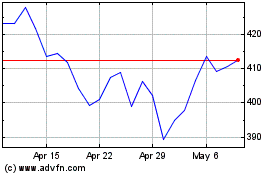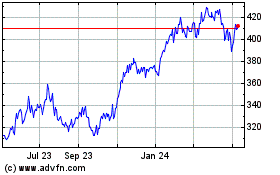Microsoft Rode Cloud To Market-Cap Prize -- WSJ
December 03 2018 - 3:02AM
Dow Jones News
By Jay Greene
This article is being republished as part of our daily
reproduction of WSJ.com articles that also appeared in the U.S.
print edition of The Wall Street Journal (December 3, 2018).
Microsoft Corp. tried through the years to compete in a range of
buzzy consumer businesses, but it was Chief Executive Satya
Nadella's focus on selling humdrum yet fast-growing computing
services to companies that allowed it to reclaim the title of
world's most valuable company.
Microsoft unseated Apple Inc. for the top spot, closing Friday
with a market cap of $851.36 billion, nearly $4 billion higher than
the iPhone maker. To get there, Microsoft also had to outpace
Amazon.com Inc., Facebook Inc. and Google owner Alphabet Inc., once
red-hot tech titans that have been roiled by congressional
hearings, investor concerns about growth and caustic tweets from
President Trump, controversies Mr. Nadella largely has avoided.
The resurgence -- Microsoft last wore the most-valuable crown in
2003 -- can be traced to Mr. Nadella's vigorous pursuit of
web-based services known as cloud computing, which had threatened
to undermine Microsoft's own business selling productivity and
data-center software companies and people installed on their own
computers.
"They built a strategy for the cloud when the cloud was really
starting to emerge," said Matt McIlwain, managing director of
Madrona Venture Group, a Seattle firm that invests in cloud
startups. "Enterprises started embracing the cloud just as
Microsoft was starting to get it right."
Microsoft's first ascent up the market-cap mountain was powered
by its ubiquitous Windows operating system and Office productivity
software, and the aggressive leadership of co-founder Bill Gates.
The CEO leveraged his Windows monopoly to move into new markets, a
strategy that launched battles with regulators in the U.S. and
abroad.
Settling those matters led to new rules for Microsoft's conduct
that slowed the company's growth. Its stock stagnated for a decade.
Since Mr. Nadella took over as CEO five years ago, Microsoft's
shares have tripled, buttressing the statuses of Mr. Gates and
former CEO Steve Ballmer -- still two of Microsoft's biggest
shareholders -- as some of the world's wealthiest individuals.
At The Wall Street Journal's WSJ Tech D.Live conference in
November, Mr. Ballmer said enterprise business powers Microsoft
today. Mr. Nadella took a company with good profit streams and
technology "to whole new levels," he said.
Microsoft's Azure cloud business has been key, with revenue
climbing more than 76% every quarter since the company began
reporting the metric in October 2015.
"I think Satya has done a great job," Mr. Ballmer said. "I think
that's fantastic and as a shareholder I think it's double and
triple fantastic."
Mr. Nadella has sought to change Microsoft's culture. On his
watch, it has taken public positions on contentious issues, calling
for regulation of facial-recognition tech and responsible use of
artificial-intelligence software. He moved away from some of Mr.
Ballmer's bets, dismantling the company's mobile-phone business,
and prioritized working with partners in the cloud and elsewhere,
putting popular Microsoft apps on Apple's iOS and Google's Android
software.
"They've succeeded under Satya because they have developed a
different persona," said Bob Muglia, a former Microsoft executive
who is now CEO of Snowflake Computing Inc., a data-warehousing
service.
Amazon still dominates the cloud. The online retail giant last
year held a 51.8% share of the world-wide cloud-infrastructure
market, according to the market-research firm Gartner Inc.
Microsoft is second, with 13.3% of the market.
Wall Street expects the cloud to keep booming. Gartner estimated
the world-wide market for cloud-infrastructure services like the
ones Microsoft and Amazon sell will grow to $63 billion in 2021
from $23.6 billion last year.
Amazon is aware of Microsoft's presence. At the Amazon Web
Services annual conference Wednesday in Las Vegas, Amazon
cloud-computing chief Andy Jassy told attendees that Amazon is
pulling in more actual dollars than Microsoft, even if its rate of
growth is slower. And he introduced a new service that lets
customers run Amazon's cloud-computing offerings in their own data
centers, taking aim at Microsoft's area of strength.
Also contributing to Microsoft's rebirth is productivity
software, which helped Microsoft gain the most-valuable crown
nearly two decades ago. The commercial version of Office 365 -- a
cloud-based subscription version of the traditional Office software
-- is among the fastest-growing pieces of a segment that accounts
for roughly a third of Microsoft's revenue.
Microsoft was once the dominant force in tech, and its use of
that power led the U.S. to sue to break it apart. But in recent
years, regulators and legislators haven't focused as much on
Microsoft.
Microsoft never built a successful social network like Facebook
that could generate concerns over data security and misinformation.
It is a distant second to Google in web search, escaping scrutiny
over data harvesting. Its Surface computer and Xbox gaming units
are a small enough part of its business that they don't appear to
be jeopardized by the trade battle between Washington and Beijing,
or a lightning rod for criticism over U.S.-based manufacturing.
Microsoft's foray into selling smartphones was a failure -- the
company ultimately took charges that exceeded the $9.4 billion
Microsoft paid for Nokia Corp. That costly period years ago ended
up insulating Microsoft today from a slowdown in the smartphone
market that has hammered Apple's stock in recent weeks.
Write to Jay Greene at Jay.Greene@wsj.com
(END) Dow Jones Newswires
December 03, 2018 02:47 ET (07:47 GMT)
Copyright (c) 2018 Dow Jones & Company, Inc.
Microsoft (NASDAQ:MSFT)
Historical Stock Chart
From Mar 2024 to Apr 2024

Microsoft (NASDAQ:MSFT)
Historical Stock Chart
From Apr 2023 to Apr 2024
